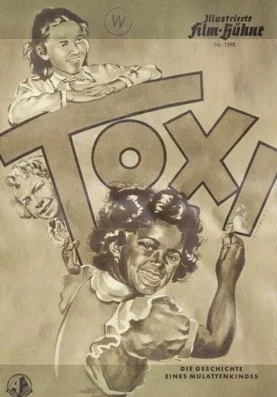- Activism
- Animation
- Asylum
- Austria
- Berlin
- Black Germans
- Childhood
- Cologne
- Colonialism
- Comedy
- DDR
- Documentary
- East/West Germany
- Environment
- Food
- Hamburg
- Health
- Holocaust
- Immigration
- Intergenerational Families
- Jewish
- Judicial system
- Lesbian/Gay
- Lübeck
- Munich
- National Socialism
- Politics
- Pomerania
- Racism
- Religion
- Sexism
- Short films
- Stuttgart
- Switzerland
- Twins
- Weimar Republic
Toxi
The melodrama, film begins with a young Afro-German girl being left at the doorsteps of the Rose family—white middle-class Germans—assembled for a birthday party. Initially, most family members treat the young girl with relatively welcome arms as they believe she is only giving a performance as a birthday surprise from an aunt. The family later discovers a suitcase that was left on the doorsteps and realize that the young girl, Toxi, has in fact been abandoned. Once the family learns that Toxi has been abandoned there is a shift in feelings regarding their acceptance of her; the possibility of the girl spending more time at the home than was expected forces members of the family to confront their racism.
The Bridge
Bernhard Wicki’s astonishing The Bridge was the first major antiwar film to come out of Germany after World War II, as well as the nation’s first postwar film to be widely shown internationally, even securing an Oscar nomination.
Jacob the Liar
A Jewish ghetto in central Europe, 1944. By coincidence, Jakob Heym eavesdrops on a German radio broadcast announcing the Soviet Army is making slow by steady progress towards central Europe. In order to keep his companion in misfortune, Mischa, from risking his life for a few potatoes, he tells him what he heard and announces that he is in possession of a radio - in the ghetto a crime punishable by death. It doesn't take long for word of Jakob's secret to spread - suddenly, there is new hope and something to live for - and so Jakob finds himself in the uncomfortable position of having to come up with more and more stories.
Herr Zwilling und Frau Zuckermann
Only two Jews who were born in the town of Czernowitz still survive, after the turmoils of the twentieth century, and they are now both in their nineties.
Geschenkt wurde uns nichts: Die Geschichte einer italienischen Partisanin
Annita 'Laila' Malavasi was an Italian partisan during the Second World War and one of the few female commanders in the resistance. She spent over a year in the Apennines, fighting against the German occupation. At the same time, she had to assert herself in the male-dominated Italian society. This film is a portrait of Laila and two of her comrades, Gina 'Sonia' Moncigoli and Pierina 'Iva' Bonilauri. It chronicles their experiences as they discuss the Resistenza and what it meant to them and many other women. This is a story of emancipation before and after Italy's liberation from fascism.
Ein deutsches Leben
Brunhilde Pomsel describes herself as an “apolitical girl” and a “figure on the margins,” but she got closer to one of the worst criminals in world history than anyone else left alive. Today aged 104, Pomsel served as Nazi Propaganda Minister Joseph Goebbels’ stenographer. Brunhilde Pomsel’s life mirrors all the major breaks and continuities of the 20th century.
Brown Babies: The Mischlingskinder Story
Brown Babies: The Mischlingskinder Story tells the personal and painful stories of Afro-American-German Brown Babies in a world where biracial, bicultural children were unwanted, ignored and forgotten. Abandoned by enemy nations and their families. Brown Babies: The Mishlingskinder Story shows how these children overcame extraordinary obstacles and honors the African-American woman who fought to save their lives when no one else would. Many archival images appear courtesy of the AFRO American Newspapers Archives.







